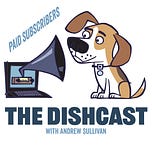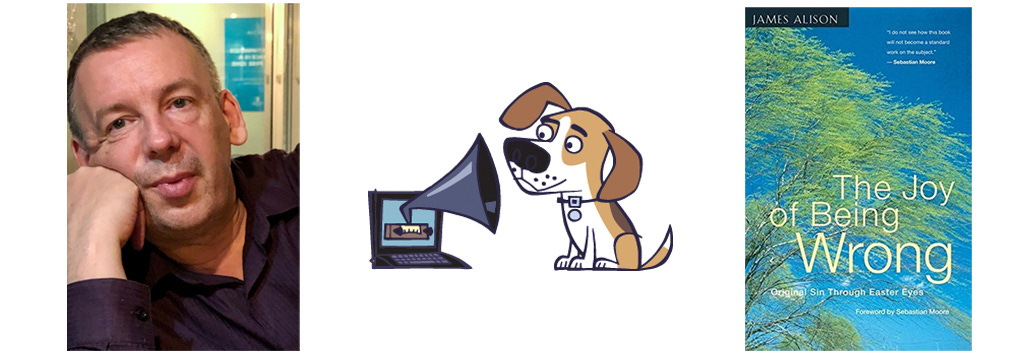(Apologies this email didn’t go out on Friday — though the episode was delivered as usual.)
James is a Roman Catholic priest, theologian and writer. His life’s work has been the application of the thought of René Girard — the French theoretician of desire and violence — to the understanding of basic Christianity. He has also stood up for truthfulness about gays and lesbians in the life of the Church; and has been a good friend for many years. Among his many books are The Joy of Being Wrong, Faith Beyond Resentment: Fragments Catholic and Gay, and Jesus the Forgiving Victim — an introduction to the Christian faith.
You can listen to the episode right away in the audio player above (or on the right side of the player, click “Listen On” to add the Dishcast feed to your favorite podcast app — though Spotify sadly doesn’t accept the paid feed). For two clips of our convo — on an exasperated but loving God, and the evolutionary role of homosexuality — pop over to our YouTube page. Read the transcript here. One of my current projects is a book on Christianity and its future; and James has been a big influence on my thinking. We range a lot here.
Other topics: the deep Etonian background of James and his family; his Tory MP father; his evangelical mother who believed in conspiracy theories; young James realizing he was gay and believing God rejected him for it; Lord Montagu and the decriminalization of homosexuality in 1967; Kameny’s role in the US; how childhood alienation can be a creative spark; James at age 12 falling in love with a Catholic boy; his conversion to Catholicism without becoming a reactionary; Original Sin; the depressing parts of the Old Testament; the passages of love in the New Testament; Augustinian teleology debunked by Darwin; the views of Socrates, Buddhism, Aquinas and Luther; collective guilt over slavery; Catholic vs. Protestant colonialism; James adopting a Brazilian child; the AIDS crisis; and political topics like Brexit, Trump and the coup in Peru.
Browse the Dishcast archives for a discussion you might enjoy (the first 102 episodes are free in their entirety). As always, please send your feedback and guest recs to dish@andrewsullivan.com. Here’s a fan of last week’s episode with Cathy Young on the USSR, Ukraine and critical theory in the US:
She was a chatterbox at times, but I really enjoyed listening to Cathy. She was super interesting, super relevant, and very sincere, and the topics you discussed are ones at the top of my own mind. Thanks for bringing her on!
Another fan of the episode:
Despite sharing nearly every one of the concerns you and Cathy shared about rising illiberalism from all corners, I remain a bit more hopeful than you two seem to be. It’s hard to see history as it’s happening, but there are many possible paths away from the current illiberal moment.
For one, having the required opinions and requisite rage is exhausting. American illiberalism is, in part, a social contagion. The pressure to have the correct opinion in any social circle, left or right, is significant. So it’s easy to be taken in. But for non-activists to sustain the radical opinions of activists — to be brainwashed, as you’ve said — is not easy. It’s easier, perhaps, for young people, who are used to living with the anxiety that their constant woke vigilance brings. But for most of us, this shit is tiring.
I was struck, though, by the tone of your comments that we need to combat this illiberalism. Instead, I tend to imagine the end of this illiberal social contagion looking less like the winning of an argument and more like the breaking of a fever. That is, as with tending to a viral fever, it will require less yelling and more heartfelt care; less combat and more patience.
I’m always reminded of Daryl Davis and his success in having Klansmen turn in their robes. It didn’t take going to battle; it just took his patience to create a human connection. Ironically, many commentators (not you!) who decry illiberalism are often too eager to berate rather than engage. Ultimately, though, their bullshit is tiring too. After some time, won’t reconnecting with people simply be easier than constantly struggling against them? Perhaps I’m naïve, but I tend to think inertia will work in our favor here.
Could our institutional decay continue our slide toward illiberalism? Perhaps, but not all is lost. Education, as you noted, is the institution most obviously infected. But even then, the same bureaucratic rot in many of our institutions may paralyze higher ed for the better: motivation to go to college is waning. The debt-relief battle has shined a light on the financial pitfalls. Academic reputations are starting to suffer (e.g., the replication crisis, COVID overreach), even among some of the leftist elite they represent. Meanwhile, organizations like F.I.R.E. and Heterodox Academy are growing, not shrinking.
Media is another potential culprit, but for all its turmoil, there’s infinite opportunity. And the evolution of media is going to be no more predictable than if we were sitting in Gutenberg’s shop in 1450 placing bets on what would happen in 1500. Cathy Young pointed out — as did Jonathan Rauch in an earlier episode — that new institutions are being built and needn’t suffer the faults of their forebears. Given the success of many moderates on new platforms, I have some hope.
Where I am the most nervous is in our political-industrial complex. I have long believed that most of the country — evangelicals and activists aside — want problem-solving and communication in a leader more than they want a particular ideology. Sadly, that’s not a choice available to us: our political corruption — e.g., a thoroughly stupid primary system that rewards opposition more than cooperation — blocks the path to sensible moderation. Electoral reform requires the cooperation of politicians — and that’s a harder future for me to imagine.
What a thoughtful, encouraging email. I sure hope you’re right — and I have my days when I suspect you are. Another listener reflects on the John Gray convo:
One of the finest pods I have ever heard. Your conversation with John elevated my current bout of religious doubt from lamentable vice to Catholic virtue. And I’ve just ordered his Seven Types of Atheism from the Toronto Public Library. Thanks for opening me to this extraordinary thinker, writer and gentleman.
But another listener takes issue with the episode:
You and Gray seem to agree that Judeo-Christianity is the foundation of Western liberalism. It would be useful for you to provide some evidence of this claim. Jesus certainly had much to say about forgiveness and treating others kindly. But “Christianity” is not what he said but the churches and their followers who credit him with divinity. When you credit Judeo-Christianity with providing the foundations of Western liberalism, what actions taken by Christianity do you have in mind? Some of my best friends are Christians, but I think of the following as the harmful outcomes of Christianity:
Listen to this episode with a 7-day free trial
Subscribe to The Weekly Dish to listen to this post and get 7 days of free access to the full post archives.













